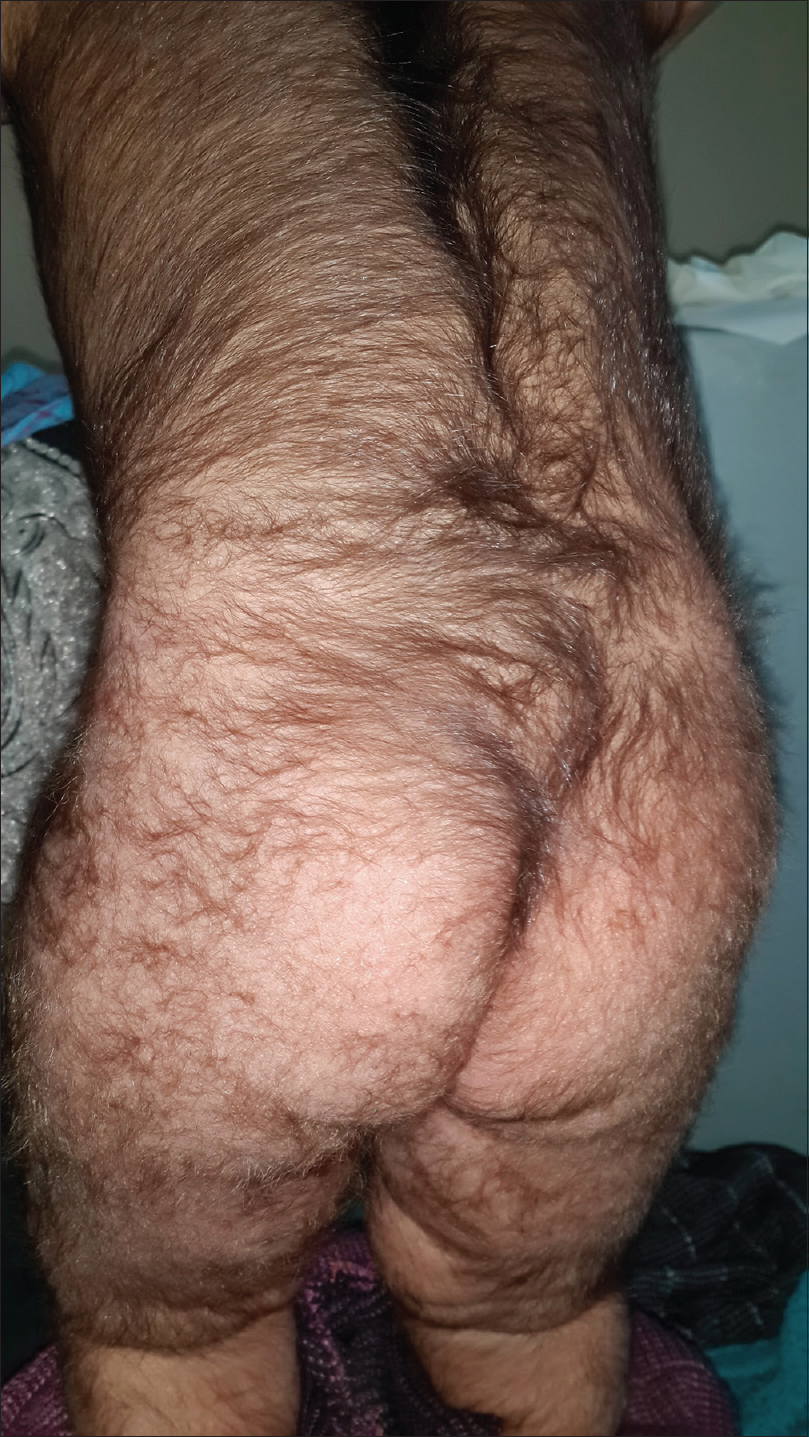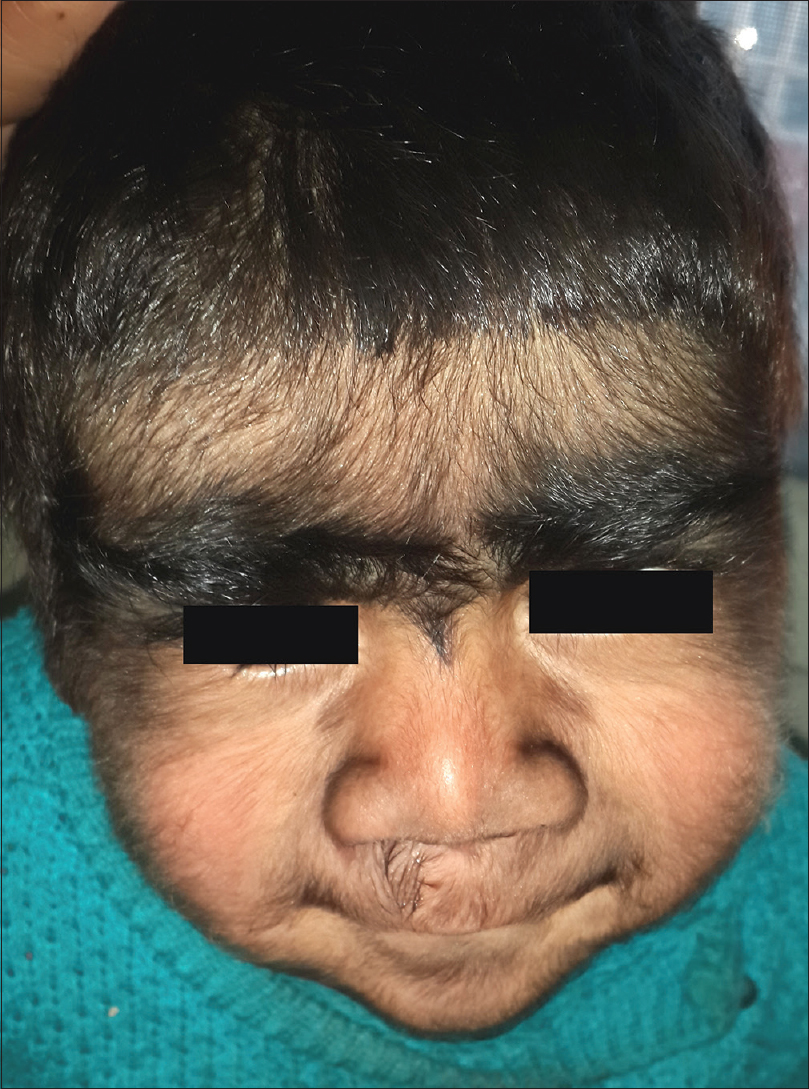Translate this page into:
Congenital hypertrichosis lanuginosa
Correspondence Address:
Iffat Hassan Shah
Department of Dermatology, Sexually Transmitted Diseases and Leprosy, Government Medical College, University of Kashmir, Srinagar, Jammu and Kashmir
India
| How to cite this article: Shah IH, Zeerak S, Sajad P, Bashir S, Bhat YJ, Mubashir S. Congenital hypertrichosis lanuginosa. Indian J Dermatol Venereol Leprol 2018;84:248 |
Sir,
Hair is an important appendage of the human body, serving a variety of functions. However, abnormalities in its growth, appearance or distribution can be a serious cause of distress for many people, causing significant psychosocial morbidity. One such disorder is hypertrichosis (either congenital or acquired), wherein a person develops hair on any part of the body in an amount that is much more than present on another individual of the same age, sex and race (excluding the androgen-dependent areas of hair growth).[1] Among the congenital variants, one type is congenital hypertrichosis lanuginosa, in which the patient presents with soft, non-pigmented and non-medullated lanugo hair, distributed all over the body (except on the palms and soles) as the lanugo hair has not been replaced by terminal hair.[2] Another variant is congenital hypertrichosis universalis, wherein the clinical presentation is the same, but terminal hair is present from birth instead of lanugo hair. Among the various syndromes with hypertrichosis as a component, Cornelia de Lange syndrome deserves mention, wherein the patient has associated features such as cutis marmorata, microcephaly, short neck and a characteristic facies.[3] Acquired hypertrichosis lanuginosa usually occurs as a rare paraneoplastic syndrome, associated with some internal malignancies.
A 10-month-old male infant, born of a non-consanguineous marriage, was brought by his parents with increased hair growth over his whole body since birth. They revealed that the child had a thick covering of smooth and fine hair at the time of his birth which was not shed and had been progressively increasing since then. The antenatal history was uneventful. The birth history was also normal with normal cry and normal movements at birth. No similar features were present in any of his siblings or any family member, either from the maternal or the paternal side. There was no other associated complaint in the child who had also attained all milestones till then at the appropriate age.
On examination, the child appeared playful and active. He responded well to visual and auditory stimuli. The anthropometric measurements were within the range consistent with his age.
Cutaneous examination revealed soft, fine black hair distributed on the face, chest, abdomen, back and both the upper and lower limbs [Figure - 1]. The forehead was relatively hairy with thick bushy eyebrows [Figure - 2] and the back showed more hair toward the midline, along with the spine. There was sparing of palms and soles. The mucosae and nails were normal. The clinical picture was thus consistent with congenital hypertrichosis lanuginosa.
 |
| Figure 1: Generalized hypertrichosis lanuginosa affecting the entire trunk and limbs |
 |
| Figure 2: Lanugo hair covering the face with darker, coarser terminal hair on the scalp and eyebrows |
A detailed set of investigations was undertaken to find out any associated anomaly in the infant. The routine hematological parameters and the hormonal profile were normal. The skeletal survey on X-ray was unremarkable and no bony deformity/anomaly was detected. Ultrasonography also revealed no abnormality and no organomegaly.
Hypertrichosis is one of the rare but important cosmetic anomalies seen in trichology. Among the several congenital variants, one variant is congenital hypertrichosis lanuginosa, rarely encountered in daily clinical practice. Excessive hair growth is often seen since birth and it continues till early childhood, resulting in lengthening of hair often up to 10 cm. The growth is more abundant on the eyebrows and eyelashes producing a peculiar “monkey” facies.[4] The disease is very rare with <50 cases reported in the world literature and an estimated incidence of 1:10,000,000.[5] The condition is clinically heterogeneous and may be associated with numerous anomalies such as dental, ocular and skeletal defects, pyloric stenosis or mental retardation apart from many others. Proper family screening, genetic counseling and advice about avoiding consanguineous marriages in such families are essential so as to reduce the occurrence of the condition in the future generation. The treatment options are limited, comprising shaving, electrolysis and laser hair removal (neodymium-doped yttrium aluminum garnet laser and long-pulsed ruby laser) for removing the excess hair.[4]
Declaration of patient consent
The authors certify that they have obtained all appropriate patient consent forms. In the form the patient(s) have given their consent for their images and other clinical information to be reported in the journal. The patients understand that their names and initials will not be published and due efforts will be made to conceal their identity, but anonymity cannot be guaranteed.
Financial support and sponsorship
Nil.
Conflicts of interest
There are no conflicts of interest.
| 1. |
Trüeb RM. Causes and management of hypertrichosis. Am J Clin Dermatol 2002;3:617-27.
[Google Scholar]
|
| 2. |
Demikova NS, Blinnikova OE, Udler EE. A case of congenital generalized hypertrichosis. Klin Med (Mosk) 1986;64:125-6.
[Google Scholar]
|
| 3. |
Liu J, Baynam G. Cornelia de Lange syndrome. Adv Exp Med Biol 2010;685:111-23.
[Google Scholar]
|
| 4. |
Gupta LK, Khare AK, Mittal A, Garg A. Congenital hypertrichosis lanuginosa. Indian J Dermatol Venereol Leprol 2010;76:699-700.
[Google Scholar]
|
| 5. |
Silveira LM, Ramos AN, Amaral IR, Rêgo VR. Do you know this syndrome? An Bras Dermatol 2013;88:473-5.
[Google Scholar]
|
Fulltext Views
7,047
PDF downloads
3,172





